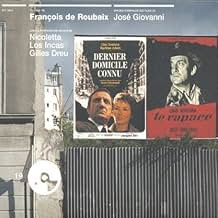Adicionar um enredo no seu idiomaPolice inspector Léonetti, a tough, efficient policeman, has been sent to a second-rate police station after being reprimanded. There he is given a partner, young and beautiful Jeanne Dumas.... Ler tudoPolice inspector Léonetti, a tough, efficient policeman, has been sent to a second-rate police station after being reprimanded. There he is given a partner, young and beautiful Jeanne Dumas. The duo are soon assigned a very difficult mission: to find a man whose evidence is instr... Ler tudoPolice inspector Léonetti, a tough, efficient policeman, has been sent to a second-rate police station after being reprimanded. There he is given a partner, young and beautiful Jeanne Dumas. The duo are soon assigned a very difficult mission: to find a man whose evidence is instrumental in convicting a murderer. They start searching throughout Paris...
- Direção
- Roteiristas
- Artistas
- Prêmios
- 1 vitória no total
- Direção
- Roteiristas
- Elenco e equipe completos
- Produção, bilheteria e muito mais no IMDbPro
Avaliações em destaque
In the early 1970s Jobert was probably France's most in-demand actress, so lovely and so endearing that it was hard not to fall in love with her. I succombed immediately on seeing her irresistible performance in René Clément's classic Rider on the Rain, where she is perfectly paired with the redoubtable Charles Bronson.
Also on the plus side are many gorgeous glimpses of Paris, by day and by night. On the minus side though, is the contrived drama of the movie. Like many French police films of the period, it tries too hard to be more than a police story. It strives to be a meaningful essay on modern society, morality and lost illusions.
Still, it's pretty good, and if you're a fan of directors like Sidney Lumet, Arthur Penn and Elia Kazan, you'll probably find a great deal to like in Dernier domicile connu.
But if your taste runs more toward Alfred Hitchcock and Fritz Lang, you can skip this one and go directly to Rider on the Rain.
Fortunately the story is good, it's a sharp and clean police procedural and it shows that José Giovanni loved it. He loved that it displayed a stubborn officer walking his beat in the midst of general hostility against police. It was really fashionable to criticise the police around 1969 and Giovanni is happy to drive the point home more than once, most prominently in Paul Crauchet's monologue, but generally in the absurdity of Lino Ventura's assignments. Subtlety is definitely not Giovanni's forte but here it blends well with the simple police procedural.
All in all this could have been a tremendous modern noir with a better director (Melville, Sautet). The result doesn't show important directorial choices. Camera work and editing are average, and sound editing is poor while François de Roubaix's score would have been sufficient to carry most of the images. In the end you will feel as if the movie simply vanishes from your memory while you were really rooting for Ventura and Joubert minutes before.
Enigmatic, brutally efficient cop Inspector Lionetti (Lino Ventura) suddenly has his stellar, albeit controversial career irreversibly tarnished by some shady internecine political machinations, finding himself humiliatingly demoted to arresting sleazy, cinema-stalking perverts. Lionetti's new female partner, the young, naive, Jeanne Dumas (Marlene Jobert) makes an appealingly sensitive counterpoint to Lionetti's brutalist approach to police procedure. There can be little doubt that a more resplendent union of amiably mismatched cops would be hard to imagine! Unfortunately, this once novel trope is zealously appropriated with infinitely less guile today. Lionetti & Dumas become embroiled in their increasingly fraught, apparently hopeless quest of locating a key witness in a tabloid-splashed murder trial who eluded discovery for 5 years.
'Dernier Domicile Connu' remains a vital, meticulously plotted example of an especially compelling, beautifully performed, emotionally rewarding 70s crime thriller. Not only expressing a clear mastery of the form but rewarding in its many delightful narrative subtleties, amusing quirks and myriad idiosyncrasies. The sublime cinematic chemistry of charismatic screen icon, Lino Ventura and angelic, Joubert provides additional lustre to their richly detailed characters that you care deeply for. Jose Giovanni's gripping crime classic also features one of maestro, Francois de Roubaix's finest, ear-wormingly brilliant scores that funkily completes a stunning ensemble of creative filmmaking excellence.
Você sabia?
- CuriosidadesMarlène Jobert tells in her biography that she and her co star Lino Ventura barely spoke to each other on the shooting because she refused to accept the role after she first accepted. But she eventually went back on her decision and she and Ventura forgot the incident several years later.
- Erros de gravaçãoThe film ends with a quotation: --- car la vie est un bien perdu quand on n'a pas vecu comme on l'aurait voulu and claims it is by Eminescu, a Romanian poet. This is wrong. The quotation is from the work of another Romanian poet, Gheorghe Cosbuc.
- ConexõesReferenced in Robbie Williams: Supreme (2000)
Principais escolhas
- How long is Last Known Address?Fornecido pela Alexa
Detalhes
- Data de lançamento
- Países de origem
- Idioma
- Também conhecido como
- Last Known Address
- Locações de filme
- Boulevard Exelmans, Paris 16, Paris, França(Leonetti brings drunken driver to police precinct)
- Empresas de produção
- Consulte mais créditos da empresa na IMDbPro
- Tempo de duração1 hora 45 minutos
- Mixagem de som
- Proporção
- 1.66 : 1
Contribua para esta página





























